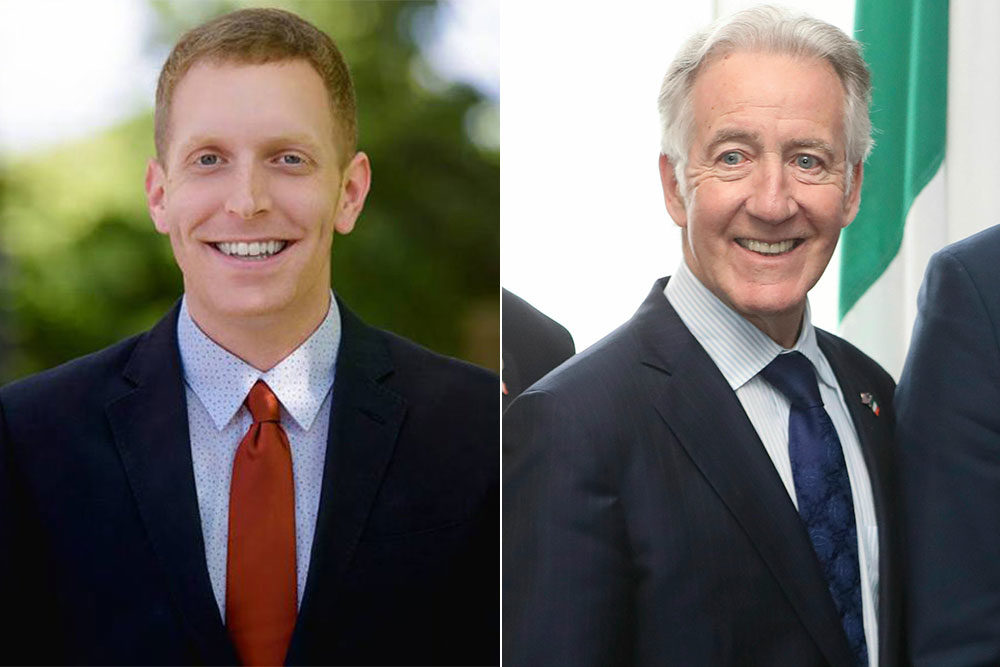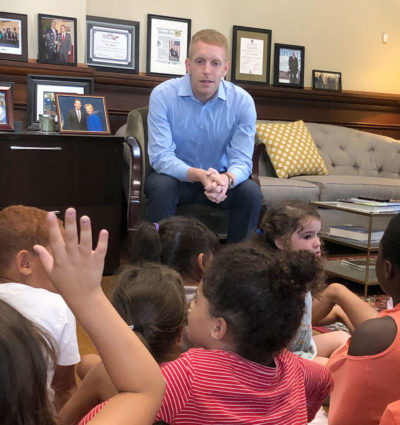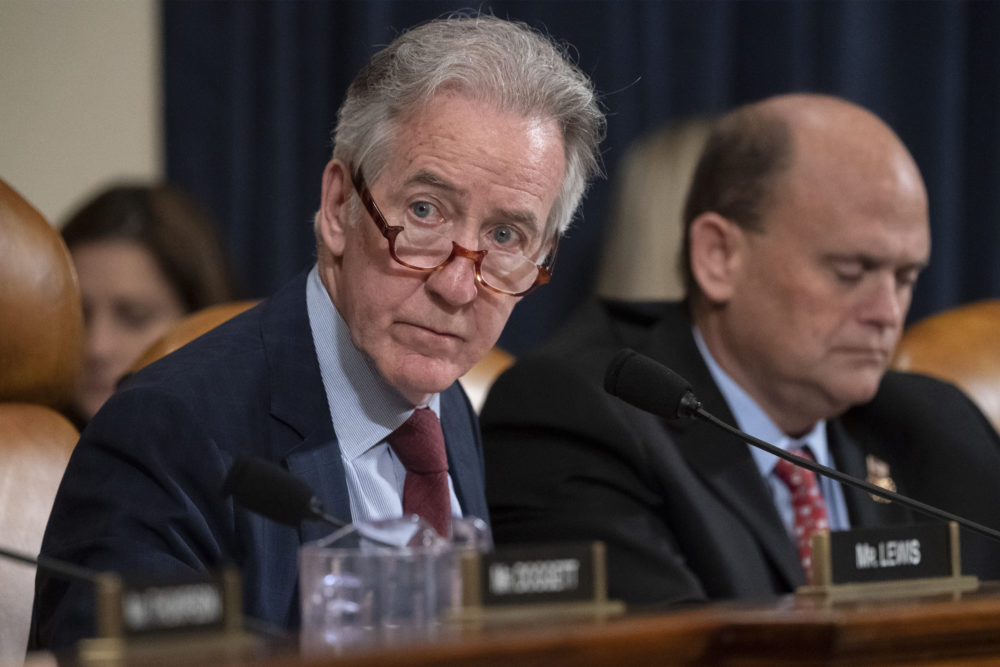Advertisement
Challenge To Neal Is The Latest Evidence Of A Political And Generational Split Among Dems

In his City Hall office, Alex Morse, the mayor of Holyoke, is spending time with some of his youngest constituents: a group of elementary school children.
"Have you all heard of an election before?" Morse asks the kids. "Usually [the winner] is the person who gets the most votes, right? Unless you're running for president."
Morse chuckles quietly to himself, but the political quip is lost on the 4-, 5- and 6-year-olds, who remain silent, until one them asks the mayor: "Can I color?"
"Maybe later," she's told by one of Morse's assistants.

Perhaps Morse is thinking about elections — and how to win them — because he has just launched a primary challenge against U.S. Rep. Richard Neal, dean of the Massachusetts Congressional delegation, in a race that offers the latest evidence of both a political and generational split among Democrats.
Morse became mayor of Holyoke in 2012 when he was just 22, making him the city's youngest mayor ever, and its first gay chief executive. The son of working-class parents, he grew up in Holyoke and became the first person in his family to attend college. During his senior year at Brown University, Morse launched his first bid for mayor, and won.
"I'm just incredibly proud of this place," he says of Holyoke, a former mill town that is among the poorest cities in the state. "It was sort of an easy choice for me to come back [home] to this place after college."
Morse is running a campaign based on his record as mayor, arguing he has turned his city around. If he wins, he'd represent the 1st Congressional District, which stretches from Springfield to the state's western edge.
Advertisement
A short walk from City Hall, Morse points proudly to Lyman Terrace, one of the country's oldest public housing projects.
"When I took office, it was slated for demolition, with a complete disregard for the generations of families who have lived her before," Morse says. "So, I pulled the [Department of Housing and Urban Development] demolition application from the federal government and we embarked on a multi-year planning process with the tenants to re-imagine this property."
Today, Lyman Terrace is in the midst of a $60 million renovation, and home to 400 residents.
Morse is a 30-year-old progressive. Neal is a 70-year-old moderate, who was first elected to the House 30 years ago — just before his young challenger was born. He is a prodigious fundraiser and among the most powerful members of the House.
But Morse says all that seniority doesn't benefit the district.
"When you think about his money and where it comes from, whether it's Wall Street or Big Pharma or the fossil fuel industry," Morse says, "[you realize that] when he does make decisions, it's certainly not for people here in the district; it's for those corporations who invest vast sums in his campaign account."
This is the main argument progressives are using against Neal — that he is beholden to special interests and boatloads of campaign cash.

According to Federal Election Commission filings, right after he took the gavel of the powerful Ways and Means Committee, Neal spent tens of thousands of dollars on fancy dinners and posh events from Washington, D.C., to Florida to California — all to woo wealthy donors, who in turn contributed hundreds of thousands dollars to the congressman.
It's the way business is done in Washington, but Morse and his fellow progressives portray Neal as the poster boy of "pay-to-play politics."
But Neal rejects the charge.
"So [Morse is] suggesting that there ought not to be a Democratic majority in the House of Representatives?" Neal asks rhetorically at an appearance this week in Pittsfield.
Neal argues that much of the money he's raised helped recruit and finance many of the candidates who delivered the House to Democrats last November. Indeed, campaign filings show that Neal is one of the top donors to the Democratic Congressional Campaign Committee, which helps elect Democrats to the House.
"We're in the majority today in the most diverse Congress in the history of America," says Neal, adding that the Democrats' success was "in some measure, a reflection of the work that I did to get them elected."
But in this era of political upsets, which knocked off veteran congressmen like Joe Crowley in New York and Mike Capuano here in Massachusetts, Neal is taking Morse seriously. Neal is already challenging Morse's mayoral record on a number of issues, including Holyoke schools, which the state took over in 2015 because of poor performance — while Morse was mayor.
"In the run-up to the Holyoke schools being placed in receivership, [Morse] missed 28 of 62 school committee meetings," Neal says. "So, I understand that there should be room for a vigorous campaign, and I'm ready."
Morse has acknowledged missing all those meetings, he says because of a busy schedule. But he says Holyoke's schools were in decline well before he became mayor, and points out that graduation rates are now up dramatically. (Neal's campaign argues that has more to do with the state takeover than Morse's leadership.)
Meanwhile, unemployment is down in Holyoke, and new businesses have moved into once-shuttered storefronts downtown.
"He's a good mayor," says Ebenezer Garcia, a longtime resident of Holyoke. "If you saw this town 10 years ago, you [would] see the difference everywhere. [We have] better schools. This mayor is behind everything ... and I think he's best for Congress, too."
But Neal has a record to run on, as well. His campaign provided a list of projects across the district for which he helped secure millions of dollars in federal funding.
That includes "infrastructure money, money for higher education, help with economic development," says Nicole LaChapelle, the mayor of nearby Easthampton, offering her own list of benefits that Neal has helped deliver to her city.
"These are bread and butter tools that mayors like myself use to promote and build a smart way forward for cities," she says.
With a political base in Springfield, the state's third-largest city, and millions of dollars in his campaign account, Neal will be tough to beat. Morse, who pledges not to accept PAC money, promises a grassroots campaign — and hopes to follow progressives like Alexandria Ocasio-Cortez and Ayanna Pressley into Congress.
"I've certainly been personally inspired by them," he says. "This whole argument that you have to be in Washington for 20 or 30 years to have influence or change the conversation has been turned upside down. It's the members of Congress who have been there for seven months who are leading the conversation on a whole series of progressive policies."
Morse supports Medicare for All, The Green New Deal and beginning impeachment proceedings against President Trump now — none of which Neal has endorsed.
But the veteran congressman points out that it was moderates — not progressives — who won in mostly purple districts and flipped the House to Democrats last November.
"That's where the majority came from," Neal says. "So, this argument that there was this [progressive] revolution — I think it might sound good for soundbites, but when you peel back the evidence, there's not a lot to substantiate it."
This race will be one of many that pits a progressive against a moderate and asks: What direction is best for Democrats? It will also be a fight across generations within the party.
This article was originally published on August 02, 2019.
This segment aired on August 2, 2019.
